Music Department Information
The Luther College Department of Music is committed to the study, development, and practice of the musical arts in the lives of our students and in the community where we serve.
The Music Department is dedicated to providing an educational experience of the first rank, training that will prepare students for a lifetime of involvement in music, as teachers, performing artists, church musicians, arts administrators, composers, or community volunteers.
Explore the Music Department
The Luther College Department of Music is committed to the study, development, and practice of the musical arts in the lives of our students and in the community where we serve. The Music Department is dedicated to providing an educational experience of the first rank, training that will prepare students for a lifetime of involvement in music, as teachers, performing artists, church musicians, arts administrators, composers, or community volunteers.
Our work is informed by an unswerving commitment to the liberal arts, intellectual rigor, a spirit of free inquiry, and the highest standards of teaching and learning. As educators and musicians, we affirm the vital importance of discipline and inspiration, and we recognize as a moral imperative our responsibility to educate the whole person—mind, body, and spirit. In all that we seek to do, we honor and affirm the transcendent, spiritual, transforming power of music and of education.
We acknowledge the historic relationship between artistic expression and religious faith, especially within the Lutheran musical tradition. We are committed to the cultivation of an active, richly collaborative learning environment. We value excellence, community, scholarship, and service.
To achieve its mission, the Department of Music provides a multitude of opportunities to study, practice, and explore the musical arts. The Department offers an extensive program of ensemble music making, ensembles large and small; professional, individualized instruction (applied music), instrumental, keyboard, and vocal; and a comprehensive undergraduate music curriculum, including coursework leading to the Bachelor of Arts in Music with credentials for teacher licensure (public school teacher certification).
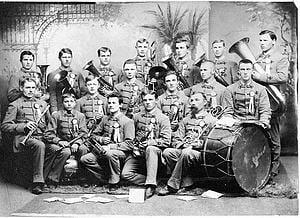
The Concert Band in 1885
Since the college’s founding in 1861, music has been a vibrant and integral part of the Luther College experience. What began as a course subject taught to young ministers as they studied theology is now a foundational pillar of the college, with almost half of the student body participating.
Students pioneered the way for the study of music at Luther. Idun Quartette, the college’s first choir, was formed in 1869, inspiring the creation of a student-led three-piece orchestra and the Concert Band shortly after. Students were key leaders in the formation of these ensembles, as they organized concerts, led rehearsals, and secured instruments. When music was added as an elective in 1892, the study of music at Luther expanded beyond learning Lutheran hymns to exploring music history, harmony, and more.
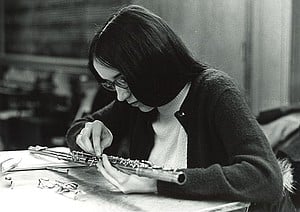
A student works on a flute repair
Shortly after his arrival, Professor Haldor Hanson consolidated these initial student efforts into the Luther College Music Union in 1895. This student union set out to create the foundation for musical interest at Luther with big dreams for the future, which were ultimately seen to fruition by Carlo A. Sperati. Professor Sperati came to Luther in 1905. Under his leadership, the Luther College Concert Band rose to critical acclaim through elongated tours across the United States and around the world, including a four-month international tour in 1914 to celebrate the 100th anniversary of Norway’s independence.
As the Music Department continued its rise in popularity and participation, the need for more faculty members and better facilities became clear. Theodore C. F. W. Hoelty-Nickel joined the music faculty in 1928 to lead the choral program. He established a mixed-voice choir in 1933, and this ensemble started touring and eventually became known as the Luther College Nordic Choir. In the early 1930s, Luther began offering a music major, which included both vocal and instrumental courses, preparing students for lives in music, especially through ministry. Also during this time, musical activities at Luther were given a more prominent home after the original home of music at Luther, affectionately called the “Chicken Coop,” was destroyed around the time New Main was constructed.
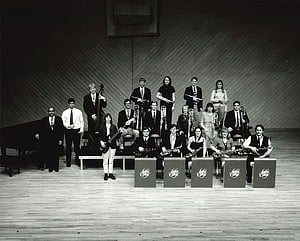
Jazz ensemble in 1998
One of the most prominent figures in the Music Department’s history, Weston Noble, joined the music faculty in 1948 on a temporary one-year appointment. After receiving high praise during his first year, Noble became a permanent and beloved member of the institution. He led a long and impressive career, directing the Concert Band until 1973 and the Nordic Choir until 2005. One of his many legacies is the Dorian program, a series of music festivals and camps for high school students. In 1949, Noble invited directors from more than 20 schools in the region to bring a few selected band students to the Luther campus for a two-day honor band festival. Now, the Dorian program offers five annual festivals for high school students in a variety of musical areas, two week-long summer camps, and even a summer choral retreat for adults.
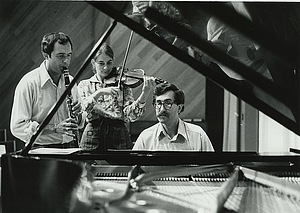
The Oneota Chamber Players comprised of faculty members Gary Davis, John Strauss, and Virginia Strauss
During the 1970s, music at Luther experienced a rise in notoriety and prestige through the work of Fred Nyline, who continued building the legacy of the band program; James Peterson and Doug Meyer, who worked with the orchestra program; and William Kuhlman, who taught and performed on the pipe organ. Additionally, Luther’s yearly Christmas celebration became a pillar of the college’s music program, assisting with the rise in attention the Music Department received during this period. Annual performances of Handel’s Messiah began in 1924 and continued as a tradition until 2004, when Noble retired. Taking its place was a tradition known as Juletide, which began in 1981 under the direction of Craig Arnold. It was initially planned in conjunction with the Messiah performance and is now known as Christmas at Luther. Today, Christmas at Luther is highly celebrated as a five-concert weekend that brings over 7,000 alumni, family, and friends back to campus for the holiday season.
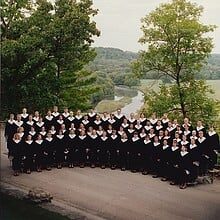
The Luther College Nordic Choir in the 1990s
Other notable programs at Luther include composition, Opera, and jazz. Music composition rose to prominence with efforts led by Maurice “Maury” Monhardt, who retired in the 1990s. Monhardt led a successful grant application for Luther to receive a Fairlight sampling synthesizer, one of the first of its kind! Composition students at Luther have numerous opportunities to showcase and hone their craft, including Music in the Shape of a Pear, a new semiannual music series. Today, student composers at Luther enjoy immersive opportunities to have their original works performed in public, to interact with other students in the same discipline, and to learn from visiting professionals through regular events on Luther’s campus.
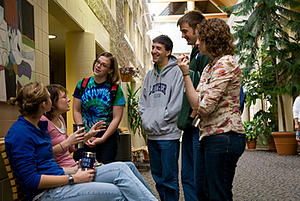
Students gather in the atrium of Jenson-Noble
Luther’s jazz program began in the late 1960s through pioneering student leadership. Beginning in the 1970s, as the nation saw a large increase in big band music at the collegiate level, Luther placed emphasis on strengthening this program. The creation of the Jazz Lab Band allowed more students to dive deeper into jazz as a field of study, and the music program eventually became more inclusive of this art form in the standard curriculum. Today, Luther students perform regularly with Luther’s two big bands and a variety of smaller combos and jam sessions. In its jazz program, Luther places an emphasis on individual expression, group identity, and collaborative acumen in the pursuit of swinging, soulful music-making.
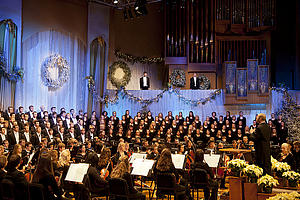
Christmas at Luther 2012
In the mid to late 1970s, David Judisch and David Greedy led the primary charge to establish opera as a core facet of the music curriculum. This significant addition began as alternating opera scenes with a fully staged opera performance and now includes opera courses and a fully staged annual opera performance. A significant push for the opera program was the establishment of the Dorian Opera Theatre (DOT), which ran from 1985 to 2003. The DOT hired professional singers to sing major roles for a full opera and included apprentices who were mostly undergraduate and graduate voice students. Professionals were hired for the opera production to design costumes, sets, lighting, and conduct a professional orchestra. DOT helped put Luther on the opera map and helped establish the college as a place where students prepared for a career in opera performance.
Today, music is heard all across campus with daily rehearsals taking place primarily in the Jenson-Noble Hall of Music. Built in 1982, Jenson-Noble was constructed to create a central hub for music-making. The building has since seen renovations, such as a major expansion in 2002 that added new classrooms, faculty studios, and a beautiful recital hall, affectionately named the Noble Recital Hall.
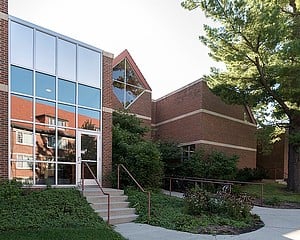
Jenson-Noble Hall of Music 2019
Now, 160 years into Luther’s rich history, the college continues to place a high value on leading a rich musical life. Through dedicated faculty, challenging coursework, ensemble tours, Christmas at Luther, Dorian programs, and much more, music at Luther continues to thrive. Just as it was in the beginning, student participation and advocacy are still important aspects of the musical experience at Luther, allowing students to shape their own journey toward the brightest future they can imagine for themselves.